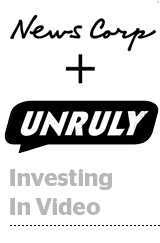 In a move that illustrates the fast-growing importance of programmatic video, News Corp. will acquire UK-based Unruly for $90 million, the companies revealed Wednesday.
In a move that illustrates the fast-growing importance of programmatic video, News Corp. will acquire UK-based Unruly for $90 million, the companies revealed Wednesday.
News Corp. will pay as much as $86 million more for Unruly’s social video advertising platform, contingent on meeting certain performance goals. The deal gives News Corp. access to Unruly’s data set of 2 trillion video views, in addition to targeting tools that can predict how a digital video will perform, based on historical sharing insights.
“The dynamic culture of Unruly, combined with the platforms and formats that Unruly has built, will help News Corp. enhance its offering to advertisers and to our consumers,” News Corp. CTO Paul Cheesbrough told AdExchanger. “Their offerings are particularly relevant in the context of the rapid growth of mobile and video inventory, and we believe they are leaders in the space.”
News Corp. has actively been snapping up tech firms in recent years. In 2013, News Corp. bought video news agency Storyful to distribute video content to partners like Facebook, Vice and YouTube. And in July, News Corp. subsidiary News America Marketing snapped up mobile saving app Checkout 51. The publisher is also a stakeholder in Rubicon Project.
Unruly will operate as a separate business led by the firms three co-founders, who will report to News UK chief exec Rebekah Brooks. News Corp. will begin offering Unruly’s ad products to its advertising and agency partners in the coming months. As for Unruly, the firm gains access to News Corp.’s premium ad inventory and access to its engaged audience.
Unruly’s platform offers four core ad features adopted by advertisers like Adidas, Dove, T-Mobile, Evian and Renault. The core offerings are ShareRank (which scores a video’s viral potential), in-feed advertising (similar to Facebook’s in-app video), in-page advertising (embedded videos in articles) and skippable in-stream ads (programmatic targeting within a video player).
“Better quality ads plus non-interruptive ad formats will improve the user experience for News Corp.’s highly engaged audiences,” Sarah Wood, Unruly’s co-CEO, told AdExchanger via email. “Unruly will be able to create new inventory with its in-feed format and increase revenues for News Corp. publications on day one, at a time when premium video inventory is scarcer than ever before and demand massively outstrips supply.”
News Corp., the parent company for a range of publications and online properties including realtor.com, HarperCollins Publishers and Dow Jones, hopes the deal will ease two major concerns: viewability and fragmented audiences.
Unruly partners with Moat for third-party viewability verification. That lets advertisers buy video inventory via RTB on a viewable impression basis, Wood explained. But fragmented consumer attention is also a fundamental challenge for advertisers, which News Corp. plans to address via Unruly’s ad formats.
“Consumers are inundated with content, their feeds are flooded and they are suffering from content shock,” Wood said. “The challenge for advertisers is to make and distribute ads that can capture people’s attention and make a meaningful emotional connection with their audience.”
Unruly has also built a programmatic buying platform, UnrulyX, which connects advertisers to inventory from publishers like USA Today and IDG Tech. And last year, the company partnered with Index Exchange to plug into programmatic demand in trading desks and DSPs.
This acquisition speaks to the continued importance of video in programmatic, according to Andrew Casale, president and CEO of Index Exchange.
“For a major media company like News Corp. to make an investment in a company with a headcount of 200 focused on technology speaks to their perception of the importance of video for their company’s future,” Casale said.
With video, 15- and 30-second spots are becoming less important, he added, while innovative formats are increasingly needed to reach users across desktop and mobile.
“The fact that News Corp. brought it in-house is even more telling,” he said.













